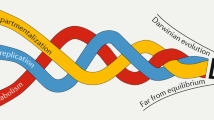Abstract
Theories of the Origin of Life can be categorised as ‘template replication first’ and ‘metabolism first’. A key question for metabolism first theories is the mechanism for transfer of inherited information. Earlier work presented a mechanism based on catalytic cycles, along with supporting results from the SimSoup artificial chemistry simulator. The current paper presents an enhanced SimSoup model that is closer to real chemistry and more open ended. Molecules and the types of Interactions between them are constructed by the model itself using simple rules based on valence theory. Results of a preliminary run of the model are presented. Most of the Molecules produced are of a few simple types with low molecular weight. There is a ‘long tail’ of many low frequency Molecules, many of which are more complex with high molecular weight.
Access this chapter
Tax calculation will be finalised at checkout
Purchases are for personal use only
Preview
Unable to display preview. Download preview PDF.
Similar content being viewed by others
References
Atkins, P.: Physical Chemistry. Oxford University Press, Oxford (2006)
Dyson, F.: Origin Of Life. Cambridge University Press, Cambridge (1999)
Fernando, C., Rowe, J.: Natural selection in chemical evolution. Journal of Theoretical Biology 247, 152–167 (2007)
Gordon-Smith, C.: SimSoup: An Artificial Chemistry Model for Investigation of the Evolution of Metabolic Networks. In: ECAL 2005, Artificial Chemistry Workshop Paper (2005), http://www.simsoup.info/Publications.html
Gordon-Smith, C.: Evolution Without Smart Molecules. In: ECAL 2007, Extending the Darwinian Framework Workshop Paper (2007), http://www.simsoup.info/Publications.html
Jain, S., Krishna, S.: Autocatalytic Sets and the Growth of Complexity in an Evolutionary Model, http://arxiv.org/abs/adap-org/9809003
Kauffman, S.A.: The Origins Of Order. Oxford University Press, Oxford (1993)
Oparin, A.I.: The Origin Of Life On The Earth. Oliver And Boyd (1957)
Pauling, L.: The Nature Of The Chemical Bond. Cornell University Press (1960)
Segré, D., Dafna, B., Deamer, D., Lancet, D.: The Lipid World. Origins Life Evol. Biosphere 31, 119–145 (2001)
SimSoup Source Code, http://code.google.com/p/simsoup/
Szathmáry, E.: The origin of replicators and reproducers. Phil. Trans. R. Soc. 361, 1761–1776 (2006)
Wächtershäuser, G.: Evolution of the first metabolic cycles. Proc. Natl. Acad. Sci. USA 87, 200–204 (1990)
Wächtershäuser, G.: The Origin of Life and its Methodological Challenge. J. Theor. Biol. 187, 483–494 (1997)
Author information
Authors and Affiliations
Editor information
Editors and Affiliations
Rights and permissions
Copyright information
© 2011 Springer-Verlag Berlin Heidelberg
About this paper
Cite this paper
Gordon-Smith, C. (2011). SimSoup: Artificial Chemistry Meets Pauling. In: Kampis, G., Karsai, I., Szathmáry, E. (eds) Advances in Artificial Life. Darwin Meets von Neumann. ECAL 2009. Lecture Notes in Computer Science(), vol 5777. Springer, Berlin, Heidelberg. https://doi.org/10.1007/978-3-642-21283-3_33
Download citation
DOI: https://doi.org/10.1007/978-3-642-21283-3_33
Publisher Name: Springer, Berlin, Heidelberg
Print ISBN: 978-3-642-21282-6
Online ISBN: 978-3-642-21283-3
eBook Packages: Computer ScienceComputer Science (R0)




